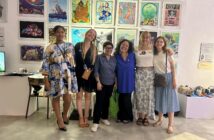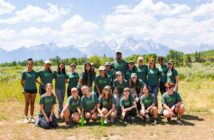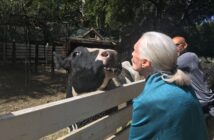The time has arrived! For many years, the Jane Goodall Institute in the Republic of Congo has been working toward the transition of many of the chimpanzees from the Tchimpounga Chimpanzee Rehabilitation Center’s original site to our island sanctuary sites. Dr. Rebeca Atencia, the director and head veterinarian of Tchimpounga, other staff and caregivers have been working on this meticulous process for a very long time, selecting chimpanzees that are good candidates for the transfer based on a number of factors. Each individual has been observed in their daily life and in their relationships with others. Over this period, many have been transferred to the islands of Tchibebe and Ngombe, and now, a final group is being formed to be taken to Tchindzoulou island!
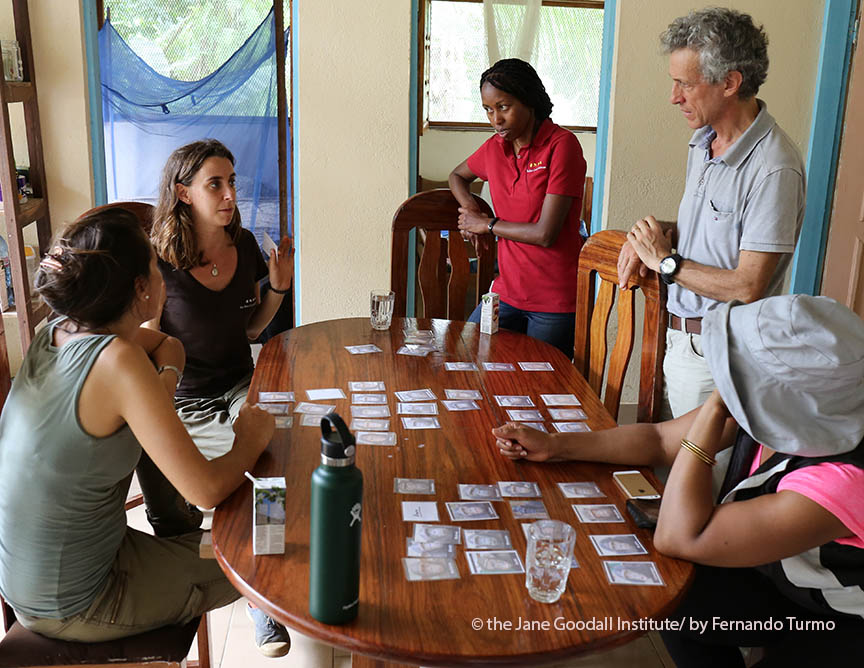
Carlos, JGI’s executive director listens to the explanations of Sofia, and Dr. Rebeca Atencia
These studies build a deeper understanding of the individual chimpanzees at Tchimpounga – in the main facility and across the island sites. Through careful observation, the JGI team identifies chimpanzees with the necessary demeanor and abilities to face the process of reintroduction into the forest with a high chance of success. With the completion of the housing facility on the island of Tchindzoulou, the JGI team is now able to successfully integrate this final forming group of chimpanzees, most able to make the journey and thrive on the island. The numerous rooms in the facility, connected by sliding doors, make it easier to undertake integrations between resident chimpanzees and newcomers. For this dynamic bunch of individuals who have been selected to be brought together, everything is changing!
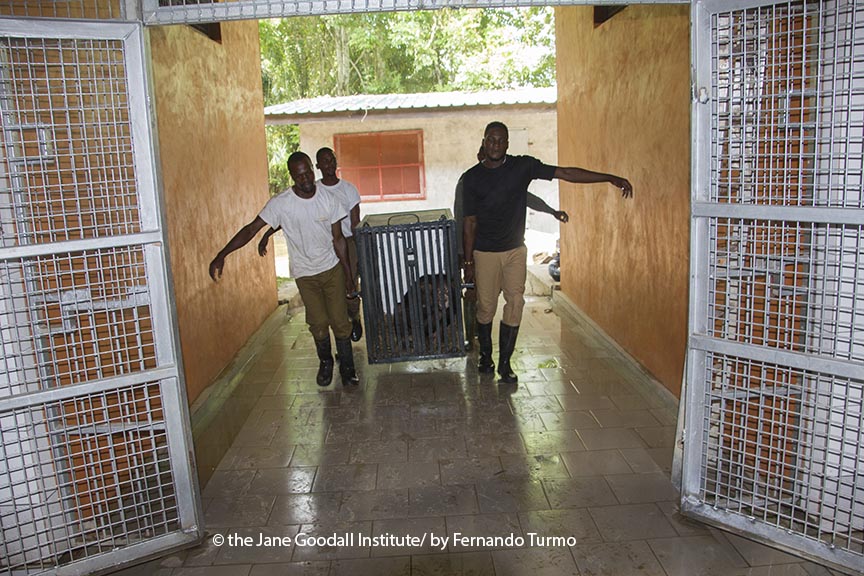
Transfer and health check. Chimpanzees transferred from Tchibebe to Tchindzoulou
The last few weeks have been very busy for the JGI team of caregivers, veterinarians and logistics who have done their best to ensure that this large amount of chimpanzees are transferred from one place to another without incident. To have the transfer go smoothly, it is necessary to sedate the chimpanzees for their own safety. The sedated chimps are then transported in boxes to the island, with continued close observation and care. This process also allows our veterinary team to perform a complete health check of each individual, including and especially their heart, which is so important for chimpanzees. No chimpanzee with any heart condition can be selected for the reintroduction program, since the stress caused by this great adventure could be dangerous for chimps with poor heart health.
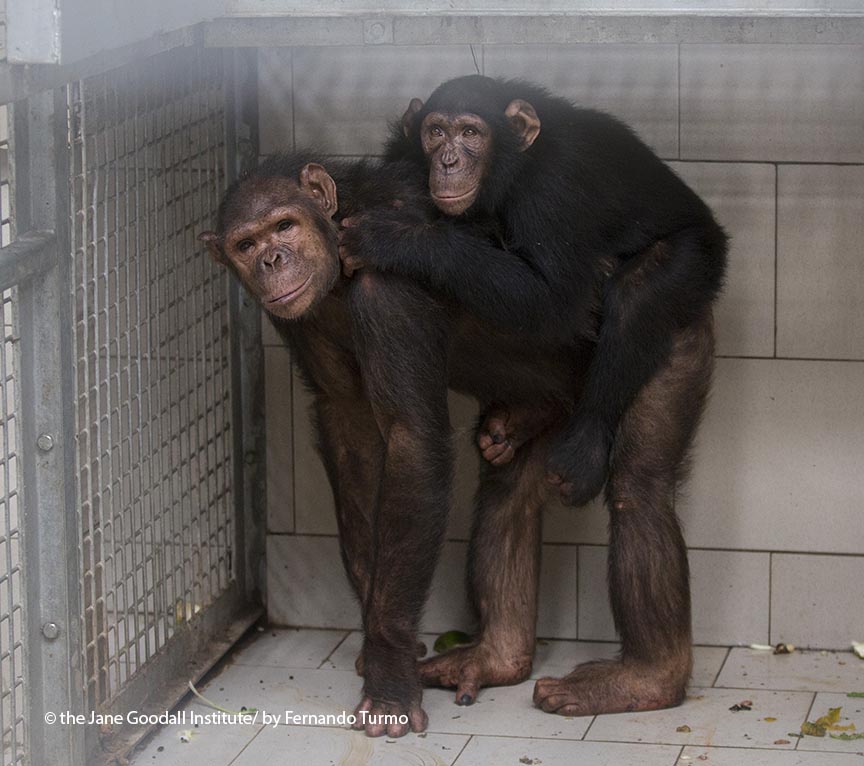
Pongou and Willy during their integration with the release group in Tchindzoulou dormitory
Slowly but with great excitement, the transferred group on Tchindzoulou is growing with the ultimate goal of reaching a size of 50 individual chimpanzees. With the numbers on the island increasing, new arrivals create a more and more complex group with an intriguing hierarchy. The JGI team has observed that the great male Chivanga is dominant and the males Loufino and Kefan are also high-ranking in the group.

Kudia, Wounda, and Vitika eating on Tchindzoulou Island
The female with the highest status is Wounda (watch Wounda’s journey here) who together with the female Golfi dominate the rest of the females, and males of inferior rank. They are two females with strong and charismatic personalities, but are at the same time are patient and wise, with a well developed sense of justice. Wounda and Golfi also each have infants who get plenty of attention and are the focus of the group. Everyone wants to come and play with them, although not everyone has the permission to do so. The female Kudia and the male Luc are two of the privileged chimps who have access to the infants. With these bold chimps at the top of the group, we will surely see a well-functioning and fascinating “family” on the island.
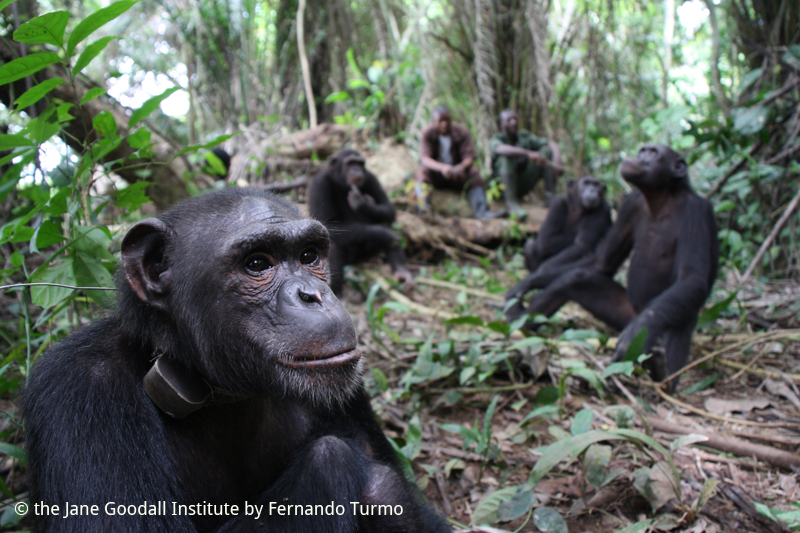
Now, the entire JGI Congo team is experiencing a bittersweet and strange feeling seeing the facilities and dormitories less full at the Tchimpounga main site. There are only two groups of chimpanzees who remain at the original site, mostly made up of adult chimps. Individuals with psychological and physical disabilities are among those that were not able to join the Tchindzoulou group, but they will continue to live robust lives at Tchimpounga. Also, chimps with signs of overly aggressive behavior, those that create great conflict, and those over a certain age are not eligible for this final process and will remain living at the original site.

Falero
Along with these individuals, there is a group of six young chimpanzees. Additionally, another chimp who will continue to stay at the main facility is a female named Lounama, as she was put under strict veterinary treatment after she demonstrated heart problems which forced the JGI team to bring her back from the island of Tchibebe. Finally, Lounama shares her enclosure with the small Falero, a real icon at Tchimpounga. Falero is the only orphan chimpanzee to come to Tchimpounga in the last three years – a positive sign of improvement as only ten years ago around eight chimpanzees were rescued and brought to Tchimpounga each year. The lessened intake is likely the result of awareness raising campaigns carried out by the Jane Goodall Institute in Congo to inform communities about illegal wildlife trafficking and the importance of protecting great apes.
Those that stay at Tchimpounga enjoy the best of the rehabilitation center, with a dense forest where they spend the days hidden among the vegetation. Perhaps one day they will also be transferred to the islands! For those now transferred to Tchindzoulou, their new fantastic adventure is only just beginning …
Stop the Show: Chimpanzees Aren’t Entertainment
Internationally, chimpanzees like and other great apes are used as props in television, film, circuses, roadside attractions, as pets and as social media share-able content. This cruel business removes chimps from their mothers at an early age stealing them from the forest, puts them into torturous training programs, asks them to perform unnatural acts, and eventually tosses these beautiful, highly social and perceptive animals aside when they are too large or aggressive to manage.
Thanks to the support of people like you, we’re able to rescue these orphan chimps and provide them the freedom of the forest once more on our island sanctuary sites. To help support the care of these chimpanzees and allow us to hold true to our promise to never turn a chimp away, consider becoming a Chimpanzee Guardian: bit.ly/chimpguardian1
There are also other ways to help us spread awareness and end the demand:
- Sign the Petition: You can help #StoptheShow by using your voice to protect chimpanzees and other animals and prevent them being put into harmful situations in the name of “entertainment.” Sign our petition and share with your friends, family and loved ones!
- Share: Click to Tweet: http://ctt.ec/QT7rH ”Using chimps & other great apes in entertainment comes at an enormous cost. #StoptheShow: Sign & share. http://bit.ly/stoptheshownow”
- Get the T-Shirt: Did you know we share 98.6 % genetic material with chimpanzees? We believe chimps should remain wild and free and not be used in the entertainment industry. Show you do, too: http://bit.ly/2rkhblf . All proceeds benefit the Jane Goodall Institute’s programs to keep chimps wild and free + rescue chimps orphaned by the illegal pet/entertainment and bush meat trades.

The Jane Goodall Institute is a global community conservation organization that advances the vision and work of Dr. Jane Goodall. By protecting chimpanzees and inspiring people to conserve the natural world we all share, we improve the lives of people, animals and the environment. Everything is connected—everyone can make a difference.







